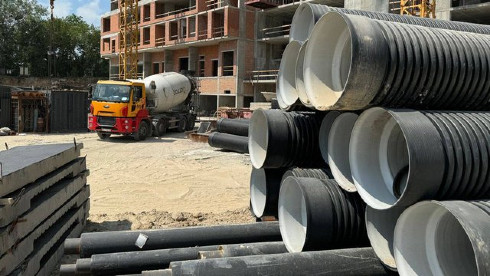
The Ukrainian Association of Developers believes that the legal conflict regarding share contributions for construction projects started after January 1, 2021, must be resolved.
“It is necessary to eliminate the legislative conflict and clearly stipulate that for construction projects whose construction began before January 1, 2021, and which, as of that date, had not been accepted into operation, and agreements on the payment of share participation between developers and local authorities as of January 1, 2021, have not been concluded, the payment of share participation shall not be charged or made. This will be in line with the original intention of the legislator to eliminate the quasi-tax and stimulate the development of the construction industry,” commented Yevgeny Favorov, head of the association’s board, to Interfax-Ukraine.
He recalled that in 2019, the authorities officially recognized that equity participation had become a source of corruption, and therefore Law No. 132-IX was adopted to abolish it. This decision contributed to a reduction in housing prices and was intended to stimulate investment activity in the industry. However, in practice, the industry has encountered a situation where communities are demanding, including through the courts, the payment of share contributions for projects for which construction permits were obtained before that date but construction began later. In particular, the Department of Economy and Investment of the Kyiv City State Administration (KCSA) is the plaintiff in 152 court cases seeking to recover share contributions from construction customers. According to Interfax-Ukraine, as of March 1, 106 such cases were pending in courts of various instances for projects launched in 2020-2022 worth about UAH 1.59 billion.
According to experts from the Association of Developers, the cancellation of share participation revealed a legislative conflict that created this legal loophole in the regulation of relevant legal relations. This was directly acknowledged by the Supreme Court in its decision of July 20, 2022, in case No. 910/9548/21, which states: “Law No. 132-IX does not regulate issues of equity participation in cases where construction of a facility began after January 1, 2021.” At the same time, in providing its own interpretation of these legal relations, the court effectively departed from the essence and intent of the legislator, which was to completely eliminate equity participation as a quasi-tax on real estate.
On May 14, 2025, in case No. 320/44099/23, the Supreme Court finally confirmed that the changes to the procedure for attracting and using share contributions adopted by the Kyiv City Council in 2019-2020 are unlawful and invalid. In other words, with this decision, the court confirmed that the legal basis used by the city authorities since 2019 to calculate share participation, conclude relevant agreements, or issue financial claims is unlawful, i.e., illegal.
“In addition to the legally unfounded position of the city authorities, another important aspect should be noted. The city already receives billions of hryvnias from developers and home buyers in the form of engineering, transport, and social infrastructure facilities that have been built and transferred to municipal ownership,” Favorov emphasized.
According to the association’s estimates, in Kiev alone, eight projects by five of its member companies have already created engineering, transport, and social infrastructure worth more than 5.6 billion hryvnia. The total cost of all the infrastructure that the city’s developers have built over the years is estimated at tens of billions of hryvnia, the head of the association said.
Many of these assets are being transferred to the balance sheets of municipal enterprises, which not only receive them free of charge but also receive a stable income by charging residents for the maintenance of the built networks.
But what is happening now — attempts to retroactively charge additional contributions — only exacerbates the already difficult situation of the most acute housing crisis in the history of independent Ukraine, he noted.
According to experts from the Ukrainian Association of Developers, such practices cause housing prices to rise, as they create a double, unpredictable financial burden on companies, which are forced to include these costs in the price per square meter.
“These costs cannot be predicted within the business model, as national legislation explicitly prohibits equity participation. The country’s political leadership bears particular responsibility in this situation, having publicly promised voters that it would abolish equity participation and improve the investment climate. However, in practice, this turned out to be a declarative gesture that was only partially implemented in law. What we are seeing today directly contradicts the state’s stated goals of deregulation, support for the construction industry, and ensuring affordable housing,” Favorov emphasized.
According to the association’s experts, the situation can be remedied by eliminating the legislative conflict and clearly stipulating that for construction projects that were started before January 1, 2021, and which had not been commissioned by that date, and agreements on the payment of equity participation between developers and local authorities had not been concluded at that time, the payment of equity participation shall not be charged or made.
The Ukrainian Association of Developers was founded in 2023. The association’s members implement projects that account for 26% of the Ukrainian market and 93% of the capital’s market.